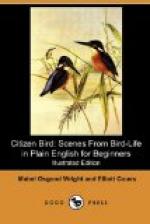“That is all very well in its way,” said the Doctor, “but which one of you can imitate his song?”
“I’ve often tried,” said Rap, “but somehow he always gets ahead of me, and I lose the place.”
“Listen! There is one singing now in the grape arbor, and he has a nest somewhere in the syringa bushes,” said Olive.
The Catbird was not alarmed when he saw that five pairs of eyes were turned upon him. He seemed to know that the secret of his nest was in safe keeping, flew out to the pointed top of a clothes-pole, and continued his song, jerking his tail up and down and showing the rusty feathers beneath, as if this motion had something to do with the force of his music. “I can hear the words as plain as anything,” said Nat; “if I only understood his language!”
“That is the difficulty,” said the Doctor; “if some kind bird would write a dictionary for us we should soon learn a great many strange things.”
“Roger, the gardener, says that Catbirds are bad things and if he had his way he would shoot them. He says they bite the strawberries and grapes and things, even when he is looking at them,” said Dodo.
“There is some truth in what Roger says,” replied the Doctor, “but on the other hand, the Catbird, besides being a merry garden neighbor and musician, which in itself is enough to pay his rent, belongs as a citizen to the Tree Trappers and Ground Gleaners, and is also a great sower of wild fruits. Though he does provoke us at times by taking a bite from the largest berries in the bed, yet he really prefers wild fruits if he can find them. So it is better for us to protect our grape arbors and strawberry beds with nets and bits of bright tin strung on twine to frighten him away from them, than to lose him as a friend and insect destroyer.
“Surely his song is worth a few handfuls of cherries. Then he is such a quick-witted, sympathetic bird, always willing to help his neighbors when they have trouble with Crows or squirrels. And when half a dozen pairs of Catbirds choose the garden for their home, you may be sure that they will furnish fun as well as music.”
“Why does he jerk his tail so?” asked Dodo.
“It is a trick that all the family have,” said the Doctor, “from which some of them are supposed to have taken the name of Thrasher, but that is doubtful. The Mockingbird thrashes about in his cage; the Brown Thrasher on the ground under the bushes; the House Wren does the same, and the tiny Winter Wren gives his tail a jerk instead, for it is not long enough to really thrash.”
“There is a bright-brown bird beating with his tail, down under the quince bushes now,” said Dodo. “Is that some kind of a cousin?”
“It’s a Song Thrush,” said Rap.
“Or rather what the Wise Men call a Brown Thrasher,” said the Doctor; “the very bird of which I was speaking.”
[Illustration: Catbird.]
“Who are the Wise Men?” asked Rap.




